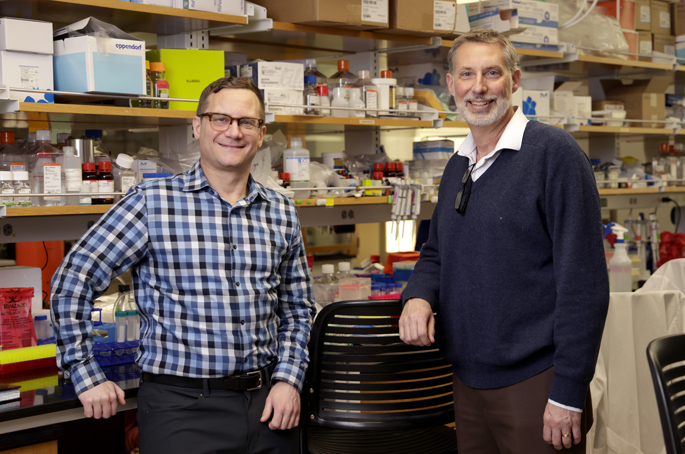A research endeavor that seeks to develop a new cancer immunotherapy utilizing nanobody delivery and targeted heating of tumors has received funding from the Waddell Walker Hancock Cancer Discovery Fund.

The investigators aim to create a novel therapeutic that will reprogram regulatory T cells, which typically suppress immune responses, into killer T cells with antitumor activity. The key to this reprogramming is the STING signaling pathway, and the force needed to unlock it is fever-relevant temperature - a hypothesis based on recent discoveries from the group on how fevers affect immune responses.
The overreaching goal is to create an immunotherapy that will benefit more patients. Only about 15% of cancer patients respond to current immunotherapies.
The project will be led by Jeffrey Rathmell, PhD, the Cornelius Vanderbilt Professor of Immunobiology, director of the Vanderbilt Center for Immunobiology, and professor of Pathology, Microbiology and Immunology, in conjunction with John Tanner Wilson, PhD, associate professor of Chemical and Biomolecular Engineering, Biomedical Engineering, and Pathology, Microbiology and Immunology.
This is the first grant from the Waddell Walker Hancock Cancer Discovery Fund, which was created in 2022 in honor of the 50th anniversary of the A.B. Hancock Jr. Memorial Laboratory for Cancer Research.
"This project is not likely one that would receive standard federal funding at this stage," Rathmell said. "It's high-risk, high-reward, and, also, highly interdisciplinary. Because of the various components, it's hard to put it into one bucket that you would normally use to go for traditional funding. I don't know if we would be able to get this very easily funded otherwise."
The Waddell Walker Hancock Cancer Discovery Fund supports basic science research projects based on innovative ideas that are considered high-risk with the potential for high rewards. Many donors have given to this endowed fund, which will provide crucial seed funding for Hancock Scholars in perpetuity.
"This fund honors the pioneering spirit of my mother, Waddell Walker Hancock," said Dell Hancock, whose family has supported cancer research at Vanderbilt-Ingram for over 50 years. "She was dedicated to the Hancock Lab and determined to support those working to find the cause of cancer. We are proud to have been part of the cancer center from the very beginning and excited to see where these Hancock Scholars will lead us in the future."
The project, led by Wilson and Rathmell, was chosen from a strong pool of applicants, said Larry Marnett, PhD, University Distinguished Professor of Biochemistry and Chemistry at Vanderbilt and director of the Hancock Lab.
"We received a number of terrific applications, but Jeff's and John's stood out because it will provide important information about regulation of the immune response in cancer and may result in the enhancement of currently employed immunotherapies. We are delighted to be able to support the collaboration of two such talented investigators. I am extremely grateful to our many donors, whose generosity honors Waddell Walker Hancock for her dedication to the fight against cancer," said Marnett, who is the Mary Geddes Stahlman Professor of Cancer Research.
Researchers in the Rathmell lab will profile gene expression changes in mouse models and human regulatory T cells in response to fever-relevant temperatures and STING activation. They will delve into better understanding these changes to define the mechanisms between STING signaling and changes to the function of regulatory T cells caused by fever-relevant temperatures.
Wilson's lab has pioneered nanobody-drug conjugates for targeted delivery of STING agonists. The STING signaling pathway is a mediator of inflammation and immune response, so the lab's next step is to further develop those conjugates to target CTLA-4, a protein receptor highly expressed on regulatory T cells.
The researchers envision using focused ultrasounds or focused magnetic resonance imaging to heat specific tumor sites instead of inducing whole body temperatures.
"We are doing basic, hypothesis-driven science while also using what we learn to try to engineer molecules that selectively activate STING in these specific types of T cells," Wilson said. "We think that this will prime the pump for reprograming of regulatory T cells from being pro- to antitumor, and then by adding heat, this will push them over the top to have even greater anti-tumor potency. The T cell becomes the drug at that point."
The professors credited Rachael Smith, a graduate student working in both their labs, for being the genesis of the project through her research with Darren Heintzman in the Rathmell lab to understand how fever alters the metabolism of the immune system. That research revealed that regulatory T cells don't work as well at suppressing the immune system in elevated temperatures and that higher temperatures lead to activations in the STING pathway.
"Fever is very fundamental, but we don't actually know a lot about it," Rathmell said.
To make a gift in support of the Waddell Walker Hancock Cancer Discovery Fund, visit give.vanderbilthealth.org/WaddellWalkerHancock.






